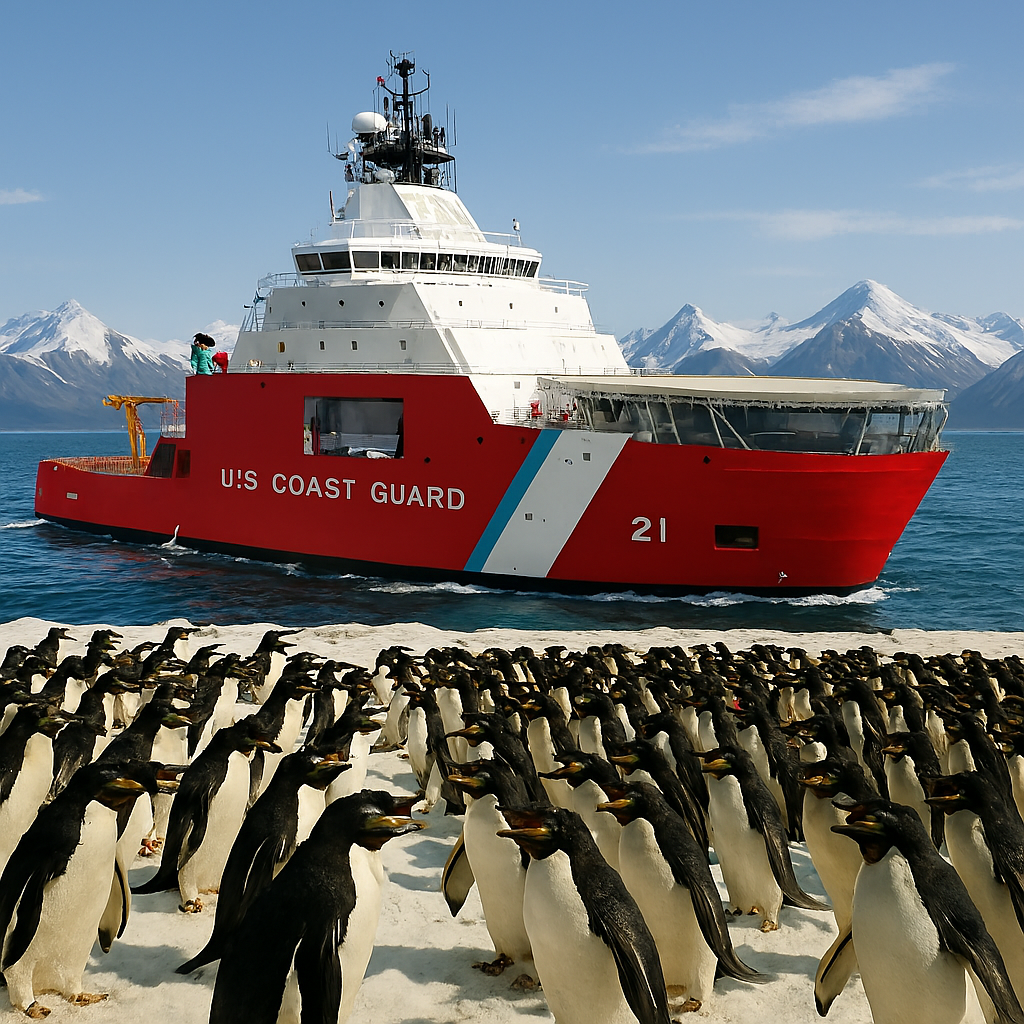Emergency Response to Arctic Penguin Uprising
- tags
- #Arctic #Operations #Story #Fake
- published
The United States Coast Guard announced an emergency Arctic Operations Initiative following reports that an organized colony of confused Antarctic penguins had somehow migrated to the Arctic and established a revolutionary government demanding fishing rights and ice sovereignty.

The crisis began when an estimated 50,000 penguins mysteriously appeared in the Arctic, apparently having made a wrong turn at the South Pole. The initiative, unveiled by Commandant Admiral Kevin Lunday during an emergency press conference, represents the Coast Guard’s most unusual maritime challenge since the Great Seal Rebellion of 1987.
“The Arctic situation has taken an unexpected turn,” said Admiral Lunday, as a penguin wearing a tiny admiral’s hat waddled across the podium behind him. “These aren’t your typical Arctic residents, and they’ve organized faster than any animal rights group we’ve ever encountered.”
Key Components of the Emergency Response
The Arctic Penguin Containment Initiative includes several unprecedented components:
Enhanced Icebreaker Fleet: The Coast Guard will immediately deploy icebreakers equipped with fish cannons and specialized “penguin-proof” hulls. The vessels will also carry emergency supplies of premium krill and tiny winter coats in various sizes.
Arctic Penguin Negotiation Center: A new diplomatic facility in Barrow, Alaska, will be staffed entirely by Coast Guard officers who have completed crash courses in “Penguin” communication. The center features a heated pool and an all-you-can-eat fish buffet for peace talks.
Emergency Wildlife Partnerships: The Coast Guard has formed unlikely alliances with polar bears, Arctic foxes, and a surprisingly articulate walrus named “Commodore Whiskers” who serves as an interpreter between species.
Environmental Confusion Management: Specialized teams will help redirect lost penguins back to Antarctica using a combination of GPS devices, ice slides, and a fleet of volunteer cruise ships playing “Antarctic folk music.”
USCGC STORIS Deployment
In response to the escalating penguin crisis, the Coast Guard announced the immediate deployment of the USCGC STORIS, the service’s brand new state-of-the-art icebreaker, to Arctic waters. The STORIS, which was originally scheduled for routine Arctic patrol missions, will now serve as the command vessel for penguin containment operations.
“The STORIS represents our most advanced icebreaking capabilities, and frankly, we’re going to need every bit of that technology to deal with these remarkably organized penguins,” said Commander Phil Baxa, who will oversee the vessel’s penguin-related operations. “These aren’t your average Antarctic birds – they’ve somehow figured out how to use ice formations as strategic defensive positions, and our standard icebreaking protocols weren’t designed for adversaries who can slide on their bellies at 25 mph.”
The deployment of the STORIS highlights the broader Arctic national security implications of the penguin situation. With increasing global focus on Arctic shipping routes and resource access, the unexpected establishment of “Penguinland” has created new challenges for maintaining U.S. maritime sovereignty in the region. The penguin colony’s strategic location near key shipping lanes has raised concerns about potential disruptions to Arctic commerce and military operations.
“While the penguin situation may seem humorous on the surface, it underscores the complex and evolving nature of Arctic security challenges,” noted Commander Baxa. “Our Arctic readiness must be adaptable to any threat – whether it’s geopolitical tensions, climate change impacts, or apparently, highly organized flightless birds with territorial ambitions.”
The Penguin Demands
The penguin delegation, led by a remarkably organized Emperor penguin who calls himself “General Wadsworth,” has presented the following non-negotiable demands:
- Exclusive fishing rights to at least three Arctic harbors
- Year-round ice cube delivery service
- Recognition of “Penguinland” as a sovereign territory
- Installation of proper sliding hills throughout the Arctic
- Mandatory Coast Guard personnel training in proper fish-throwing techniques
“These penguins are surprisingly well-organized,” reported Rear Admiral Nathan Moore, Director of Arctic Operations. “They’ve established a functioning government, a postal service, and what appears to be a highly efficient fish distribution network.”
Strategic Complexity
The situation escalated when the penguins demonstrated their ability to:
- Navigate icebreakers using their bellies as sleds
- Organize coordinated fishing operations that outperform human fleets
- Communicate with Arctic seals, who have agreed to serve as underwater reconnaissance
- Build ice fortresses that are “architecturally impressive and surprisingly comfortable”
“We’re dealing with an intelligence we never anticipated,” explained Admiral Lunday. “Yesterday, they successfully intercepted and redirected a cargo ship carrying frozen fish sticks. The crew reported being ‘politely but firmly escorted’ to penguin territorial waters.”
Funding and Timeline
Congress has allocated $2.8 billion over five years to support the Arctic Penguin Management Initiative, though $1.2 billion is specifically earmarked for fish purchases and ice slide construction. The Coast Guard plans to establish a permanent Penguin-Human Relations base in Utqiagvik by 2026, complete with heated swimming pools and a state-of-the-art fish processing facility.
“This initiative demonstrates our nation’s commitment to maintaining peaceful coexistence with unexpected Arctic residents,” said Admiral Lunday, as General Wadsworth approached the podium to deliver what appeared to be a prepared statement in fluent penguin.
The penguin delegation has agreed to a temporary ceasefire while negotiations continue, though they’ve insisted on keeping their ice fortresses and have demanded that all Coast Guard vessels play “penguin-approved” music during Arctic patrols.
Recent developments include the discovery that the penguins have somehow established a successful ice cream business and are now the Arctic’s largest supplier of premium frozen treats.
This is a fake story